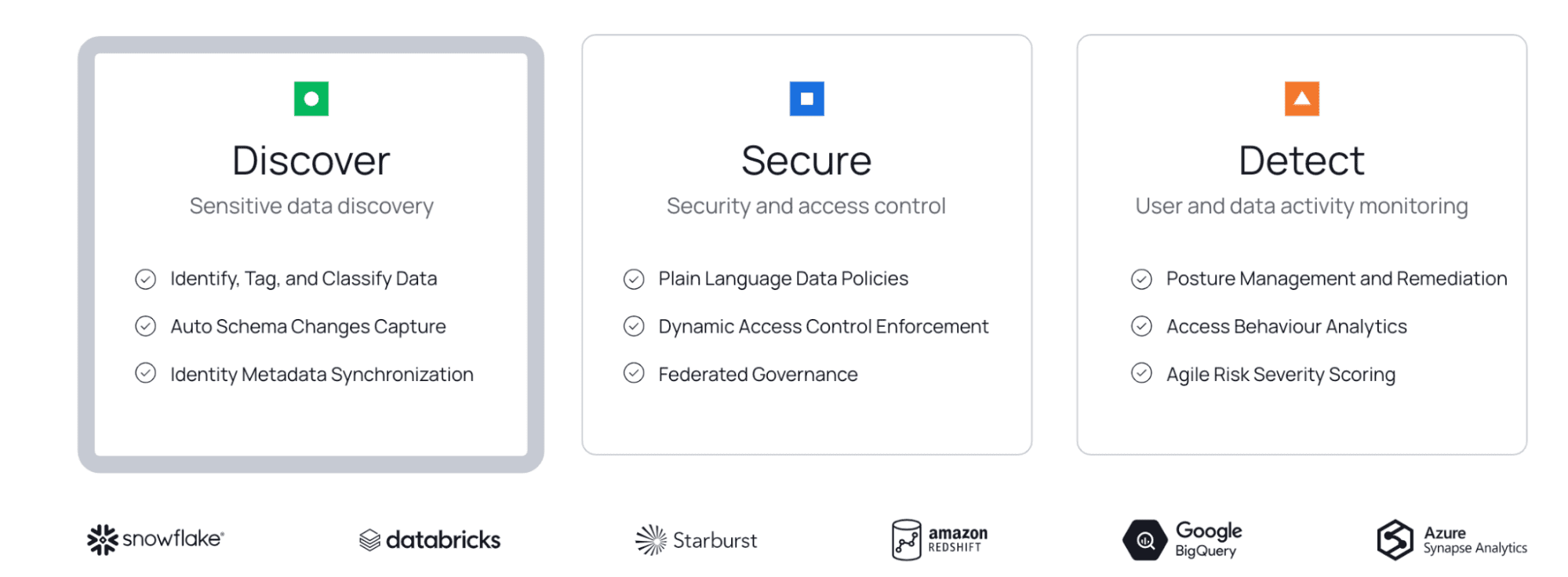Effective sensitive data discovery (SDD) capabilities are essential for data protection, governance, and regulatory compliance. The first step in achieving these objectives is understanding which types of data are classified as sensitive, where that data is located, and its security status. With this knowledge, organizations can take appropriate measures to safeguard sensitive data. Hence, an efficient sensitive data discovery approach plays a crucial role in ensuring your data remains secure while avoiding regulatory penalties.
In this blog, we’ll introduce you to Immuta’s localized sensitive data discovery and explain how it helps streamline operations at scale, without risk of breaching ever-evolving data localization requirements.
The Top 3 Benefits of Localized Sensitive Data Discovery
We are excited to announce the latest release of Immuta’s SDD with localized support for Databricks (in private preview), in addition to the previously announced localized support for Snowflake.
Here are the top three benefits of localized SDD:
- Solving for data localization: Companies that have stringent data localization rules can ensure that data never leaves their Databricks environment. As data localization laws become increasingly common, those with jurisdictional requirements aren’t burdened with the need to set up private networking or regional Immuta instances that add time and increase costs.
- Resilient scaling: Localized SDD uses cloud platform-native capabilities, such as Databricks query execution, to perform computation. This helps with query performance, efficiency, and reliability. Scanning data is not bounded by the resourcing of your Immuta instance. Using efficient native methods ultimately reduces operational costs while improving productivity.
- Reduced overtagging: The latest enhancement uses a more sophisticated scoring methodology that reduces overtagging where false positives can be applied to customer dictionaries. This increases operational efficiencies and tag quality.
What Are the Key Components of Modern Sensitive Data Discovery?
Within cloud data ecosystems and architectures like data mesh, data is widely distributed across domains. Data platform owners, security teams, and governance stakeholders are responsible for knowing what data exists across the enterprise, the sensitivity levels of that data, and which controls are in place to protect it. A modern sensitive data discovery solution must be built to help answer these questions while operating seamlessly in complicated environments.
Therefore, a modern SDD approach should be able to:
- Integrate with a broad range of cloud data platforms for consistent discovery and security.
- Scale data discovery across millions of fields and thousands of tables.
- Enable clear and concise workflows to approve tags, improving quality and collaboration.
- Provide built-in classifiers for a broad range of data elements, as well as customizability for unique business cases like classification of non-standard identification numbers.
- Process data discovery locally in an organization’s environment to comply with strict localization and jurisdiction rules.
- Detect changes to schemas/tables so that no sensitive data goes uncaptured.
How Does Immuta Enable Localized SDD?
Immuta’s Discover capabilities are a key pillar of the Immuta Data Security Platform. Immuta discovers sensitive data from millions of fields by profiling registered tags such as PII, PHI, or others, and allows teams to leverage 60+ pre-built classifiers or design their own classifiers with acceptable confidence levels.

With an easier way to assess the sensitive data footprint, data teams can then leverage Immuta Secure to write dynamic and easy-to-understand policies to protect sensitive data. This features allows users to:
- Write policies once and enforce them everywhere with dynamic, native data security and privacy controls.
- Delegate policy responsibility while enforcing a consistent framework for data mesh use cases.
- Define permitted purposes for data use with user acknowledgements of required consent language.
Data and security teams can also leverage Immuta Detect to analyze their organization’s data security posture and answer questions like:
- Who accessed what sensitive data, and when?
- What are the most trafficked data sources containing sensitive data?
- What users were most active in accessing sensitive data?
Automated data identification with Immuta’s localized SDD helps inventory sensitive data, and ultimately secure and monitor the usage of that data across key data assets. Read more about data classification in this guide.
Take the Next Step with Data Classification
See how SDD goes hand-in-hand with data classification.
Get the Guide


